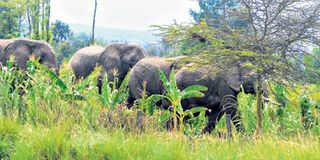Inside State’s Sh14bn human-wildlife conflict compensation plan

A herd of elephants invade a farm. The government has unveiled a comprehensive plan aimed at eliminating longstanding human-wildlife conflicts.
The government has unveiled a comprehensive plan aimed at eliminating longstanding human-wildlife conflicts and insecurity within the next five years.
The announcement by President William Ruto was made during the launch of the Human-Wildlife Conflict Compensation programme and the Digital Compensation programme in Rumuruti, Laikipia, one of the most affected counties by human-wildlife conflict.
In the plan, all game reserves will be fenced off within this timeframe, with the Ministry of Tourism tasked with conducting a survey to determine the total kilometres to be fenced across the country.
Under the compensation programme, the government will allocate a total of Sh7 billion for victims between 2014 and 2020, along with an additional Sh3 billion for the period between 2023/2024, which must be verified and approved within 60 days.
Furthermore, Sh4 billion has been allocated for verified compensation between 2021 to 2023. The president also introduced a digital compensation process to expedite claims verification and approval. Dr Ruto also introduced a digital compensation process to expedite claims verification and approval.
In addition to increased compensation for death from Sh200,000 to Sh5 million, President Ruto announced affirmative action slots for communities affected by human-wildlife conflicts in the recruitment of Kenya Wildlife Service (KWS) officers.
He stressed the importance of streamlining the compensation process, likening it to a journey more complex than going to heaven, which must now come to an end with the newly launched digital platform.
Claiming compensation is a journey that is more complex than going to heaven. This must come to an end, it’s not possible for suffering victims to wait for compensation for eternity due to a cumbersome process and bureaucracy. That will be addressed by the digital platform we have launched,” said the president.
National Assembly Majority Leader Kimani Ichung’wa was directed to prioritise all compensation-related funds in parliament.
The allocated funds include provisions for deaths, injuries, and crop destruction caused by wildlife.
President Ruto assured the public of ongoing efforts to enhance security in Northern Kenya, with investments in equipment and additional deployment of Kenya Police Reservists (KPR) to secure Northern Kenya.
The 1,071 dead between 2014 and 2020 will get Sh4 billion, Sh2 billion for injuries and Sh852 million for crop destruction while the 218 killed in 2022/2023 will receive Sh1.6 billion, Sh592 million for injuries and Sh599 million for crops destroyed.
The government has invested Sh27 billion for equipment, reason being that bandits took advantage of ill-equipped security officers to terrorise communities. Laikipia County will get 250 additional KPR in addition to the 350 on the ground to ensure and all of Northern Kenya becomes bandit-free.
“I give you my word that theirs are kicks of a dying horse for we are eliminating the bandit menace and taking them where they belong. Kenyans must be secure,” said the president.
DP Rigathi Gachagua said launch of the programme was among the ruling coalition UDA’s campaign pledges.
“During the campaigns, it was wish of the Laikipia community to sort insecurity and human-wildlife conflict. Today, Mr President, you have fulfilled that pledge. We will not allow human-wildlife conflict. [Rogue animals] won’t be allowed to kill our people and destroy property. They are meant to attract tourists so that the income generated can benefit the residents,” said the DP.
Wildlife and Tourism CS Alfred Mutua said he receives weekly data on victims of wildlife conflict, which has increased in recent weeks, adding that the focus will now shift from compensation to prevention.
He said his ministry is constructing water pans and dams for both humans and wildlife and that the ministry will ensure snake bite treatment drugs are available in hospitals across the country.
Dr Mutua added that permanent wildlife movement corridors have been considered to ensure unrestricted migration of wildlife even with the containment offered by electric fences.
Taita Governor Andrew Mwadime said the kitty was a timely benefit for communities neighbouring game reserves and national parks.
Samburu Governor Jonathan Lati Leleliit said the tourism sector relied on wildlife, but faulted the fencing of wildlife conservancies as it will kill tourism in some counties.
“You can’t separate wildlife and humans. Tourism depends entirely on movement of the wildlife, so we need to learn to coexist with the animals,” said Laikipia governor Joshua Irungu.
Majority Leader Kimani Ichung’wa said parliament will ensure the compensation funds were properly administered.
Laikipia East MP Mwangi Kiunjuri lamented insecurity by bandits and wildlife were Laikipia County main challenges, adding that the last compensation was done in 2018.
“Your plan to reduce the compensation period is most welcome. The fencing of Loriak Forest you just launched will end the human-wildlife conflict, but we also appeal for more KPR officers in addition to the 350 to be issued with guns,” said Mr Kiunjuri.
A national wildlife database has been proposed – the first initiative in Africa - that will incorporate all wildlife-related matters to enable more rapid responses before human lives are lost.
Laikipia and Samburu have over 5,800 elephants that also travel/migrate into Isiolo, Meru and Mt. Kenya areas during times of drought. However, a wildlife census will be conducted to establish the current status to guide on policy formulation and implementation.





